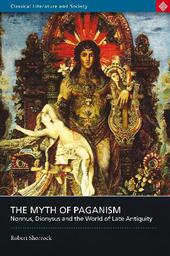
|
The Myth of Paganism: Nonnus, Dionysus and the World of Late Antiquity
Paperback / softback
Main Details
Description
Traditional and still prevalent accounts of late antique literature draw a clear distinction between 'pagan' and 'Christian' forms of poetry: whereas Christian poetry is taken seriously in terms its contribution to culture and society at large, so-called pagan or secular poetry is largely ignored, as though it has no meaningful part to play within the late antique world. The Myth of Paganism sets out to deconstruct this view of two contrasting poetic traditions and proposes in its place a new integrated model for the understanding of late antique poetry. As the book argues, the poet of Christ and the poet of the Muses were drawn together into an active, often provocative, dialogue about the relationship between Christianity and the Classical tradition and, ultimately, about the meaning of late antiquity itself. An analysis of the poetry of Nonnus of Panopolis, author of both a 'pagan' epic about Dionysus and a Christian translation of St John's Gospel, helps to illustrate this complex dialectic between pagan and Christian voices.
Author Biography
Robert Shorrock teaches Classics at Eton College, Windsor, UK, and is co-editor of the journal Greece & Rome.
ReviewsArt is still art, no matter what is thought to have inspired it. "The Myth of Paganism: Nonnus, Dionysus and the World of Late Antiquity" discusses Pagan poetry and literature, as Robert Shorrock hopes to dispel the myth that this work was any lesser due to the rising power of Christianity, and critiques much of this dismissed work in comparison to other contemporary work and how it still holds its influence in later writing, much like the late-antiquity Christian works. "The Myth of Paganism" is scholarly critique about the importance of these forgotten artists.
|